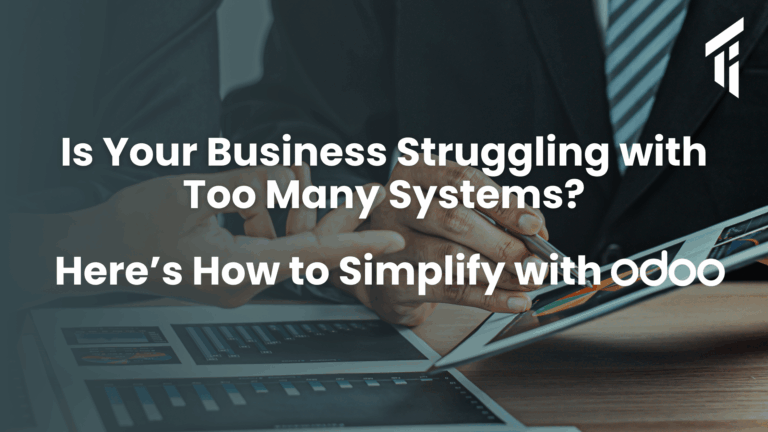Key Highlights
- Recognising the limitations of your current ERP implementation is crucial for business growth and efficiency.
- Outdated ERP installations can create inefficiencies, increase costs, and restrict your business growth.
- Sometimes reimplementing your ERP system can offer benefits like enhanced functionality and improved efficiency at a lower cost that replacement.
- When choosing to reimplement your ERP or replace it, consider factors like scalability, integration, and vendor support.
- Planning, communication, and right sized training are vital to overcome challenges during any ERP change.
Reimplement your Existing ERP or Replace it?
An ERP system, or enterprise resource planning system, becomes a critical business tool, once you complete your first implementation. Presuming the implementation met your needs, it quickly becomes an integral part of your process efficiency. But as your business grows, your needs and strategy will change.
Does your ERP still meet your needs or is it time to reconsider? If it’s been more than 10 years since you implemented your system, it is definitely time to evaluate where you are.
Sometimes your ERP is fine, but old implementations rob you of the benefit of new features. Often a reimplementation is the only way to achieve the full benefits. Let’s look at what to think about when deciding to update your current ERP or move to a new one. I will also explore the possible benefits and challenges of this decision.
If you have a dated Odoo implementation it is worth a conversation with our experts to see how you might benefit from a reimplementation, which is usually less expensive and more beneficial than replacing Odoo.
Recognizing the Need for an ERP Decision
There comes a time for any business when their ERP system begins to be an obstacle rather than a competitive advantage. Recognising the situation before it becomes a serious problem is important. Growth, changes in the market, and business expansion require a system that can adapt and grow, but every system and every implementation is based upon very specific requirements that can change after implementation is complete. Once they do change it can create havoc within your organisation.
It is important to periodically look for and recognise the limits of your current system, and a to evaluate solutions.
Quick Check of your current ERP:
Consider these questions:
- Is it more of an obstacle than a benefit?
- Do too many “work arounds” exist?
- Does your team build spreadsheets to compensate for data weakness?
- Are there issues with data separated into silos that rob you of intelligence?
- Is it hampering your growth?
The answers will provide insight: Is it time to consider options for your ERP system?
When Current Systems Can’t Keep Up with your Business
Business growth and profit require efficiency and controls and you should be able to count on your ERP to help. But aging ERP systems can work against you and prevent your organisation from reaching its full potential. When you check your current ERP system, think about its scalability. Can it manage more data, users, and transactions as your business gets bigger? Carefully consider how your business has changed since the implementation and review how the ERP handles those areas of your business.
Implementations don’t always build in flexibility and will reduce your ability to adapt to fast-moving markets need. Technology changes quickly and sticking with an outdated ERP can cause you technical challenges. Technical or functional, these challenges may prevent installation of helpful features and ERP updates that could give you an edge over your competitors.
It is important to closely examine how well your current system can support your expected business growth. Whether your ERP is no longer configured for your business, or is just technically challenged to keep up, you will need to decide if you need to make changes to your ERP system.
You have choices: Replace or Reimplement. Just because your system was implemented a number of years ago specifically for how your business operated at that time, doesn’t mean it’s a bad ERP. It might actually prove its a good ERP and that your teams understand it. Maybe it needs to be reimplemented so that it matches your business today.
Many times, reimplementing an existing Odoo ERP, using the latest version and aligning it to the current business need can provide significant benefits to the business.
Lack of Integration Leading to Siloed Data
Data management and access has become a powerful benefit of an ERP system. ERP systems are great at connecting different departments, making necessary data available. They establish a clear transactional view of data flowing through the system. But an outdated ERP implementation likely hasn’t kept up with your external systems.
When departments work alone and data is in multiple systems, it is hard to see what matters for decision-making. The result is often teammates sharing spreadsheets to compensate for the lack of connectivity.
This lack of integration can lead to:
- Wrong reports and forecasts
- Problems with inventory management
- Poor communication between departments
- Departments creating spreadsheets to bridge the gaps
Updating the ERP system will fix these integration problems. It will provide better ways to keep your data aligned to management needs.
The Impact of an Outdated ERP on Business Operations
An older ERP implementation can cause complications for the whole organisation. It can affect various parts of business operations which impact efficiency and reduce profits. It may slow down productivity and create barriers to growth. The issues grow, the frustration mounts and the business suffers.
Reimplementing or upgrading your ERP system becomes the only choice. If properly done, it will smooth operations, improve productivity and generate valuable data for decision-making. In many ways, upgrading or reimplementing can be more valuable for your business than the original implementation was.
Inefficiencies in Process Management
When your business operations are slowed down by manual tasks and workarounds, it shows that your ERP system needs help. Outdated ERP systems often cause problems because they can’t keep up with changing business needs. This will lead to manual workarounds which always creates delays, errors, and slowdowns.
Using manual workarounds to fix system problems will also cause data issues. These issues will affect different departments and their processes, and cause a need for manual spreadsheets. Mistakes in how orders are processed will lead to wrong inventory counts, backorders, and unhappy customers.
By reimplementing your ERP system, you can improve your process management, automate manual tasks, tune the system to your operational needs, and focus on business improvement. Removing inefficiencies creates a more customer friendly and error-free work environment.
The High Cost of Manual Interventions and Errors
The real effect of using an old ERP system shows up when you look at the total cost of ownership. At first glance, investing in a new system might seem overwhelming. But, operating on an outdated or misaligned system can cost much more in the long run.
Manual tasks might seem small, but they add up over time. Dependance on manual effort is acceptable in good times, but when markets become challenged and profitability is at risk, maintaining staff because of manual processes can be disastrous.
Manual dependancies will also cause mistakes, customer dissatisfaction, time spent creating manual rules to govern the manual work and ultimately harm your company’s reputation.
Implementing a new ERP or reimplementing your existing ERP system reduces these risks and eliminates many manual tasks. When you automate processes, improve data accuracy, and give employees real-time information, you can save a lot of money.
Key Benefits of Reimplementing Your ERP System
Reimplementing your Odoo ERP system is more than just getting new technology; it can be the smart choice to realign ERP capabilities with your business priorities. In the process you help your team improve their work, enhance data integrity, eliminate many of those spreadsheets and re-establish a level of operational efficiency.
Besides making things run better and reducing costs, reimplementation of Odoo helps people work together better, optimizes customer intelligence data for stronger relationships, and creates a solid base for growth that lasts.
Staff Familiarity for Enhanced Productivity
To improve work efficiency, it is important for staff to understand the ERP implementation process. When workers know the new ERP system well, they can use its features better. In a reimplementation this process is an opportunity for your team to relearn Odoo with its new features but presented in a familiar manner. This leads to smoother business operations. Training sessions on Odoo ERP software can help staff feel more confident and can make daily tasks easier. This fits well with the company’s goals. Mastering the Odoo ERP processes helps employees make better choices, improve customer service, and manage the supply chain better. Putting money into staff training is key for a successful ERP rollout. This can boost efficiency and improve business performance.
Newest Features Provide Competitive Advantage
The business world is constantly changing, and the Odoo ERP is no exception. When you decide to replace your ERP with Odoo or to reimplement to Odoo system, you gain access to the latest features and newest capabilities. These new tools help your company stay ahead and maintain a solid position in the market.
Modern Odoo ERP solutions include new technology like the AI dashboard, predictive analytics, and better data security. These improvements change offer enhancements to your business. They provide information to assist you in making decisions quickly and wisely.
By using the new features from your Odoo ERP system, you can improve your operations. It’s not automatic, and it still takes some effort, but the results will make a difference.
Odoo is a Modern ERP Solution
If you’re looking to reimplement Odoo or replace another aging ERP, take a close look at what Odoo offers. Choosing an ERP solution is not the same for everyone but it’s important to let your business priorities drive your ERP review.
Key aspects of the current Odoo platform include scalability, integration, and advanced analytics. Get in touch Target Integration to discuss opportunities for Odoo and the potential improvements of either a new or reimplementation.
Scalability to Support Business Growth
Scalability a consideration but most ERP systems, including Odoo are based on data technologies that assure you of scalability to a certain point. Odoo will support your business growth without needing a complete restart. As a modern ERP, Odoo will handle growth and increases in data, users, and transactions easily.
Comprehensive Integration Capabilities
Odoo offers powerful integration capabilities and when combined with the custom software development capabilities of Target Integration, any system interfaces can be built.
Good integration gets rid of data silos and provides full enterprise visibility on one pane of glass. Make better decisions, be informed instead of behind and lead your organization to success.
Planning Your ERP Reimplementation Strategy
A successful ERP reimplementation, just like a first time implementation, needs a good plan. Let our staff define a roadmap for you that will explain the scope, timeline, and the resources needed for a smooth rollout.
Keep in mind that an ERP system is not an instant fix. It takes a well-thought-out approach, executive endorsement and the proper support to see results from its full potential.
Conducting a Needs Assessment and Setting Objectives
Before you start to reimplement an ERP system, it’s important to do a careful needs assessment. Target Integration will help identify the pain points, inefficiencies, and limitations of the current system. With that, we can outline clear and measurable business objectives that you want to reach with the Odoo reimplementation.
Next, define the specific functionalities, modules, and customisations that are important for your business processes. It’s also beneficial to identify key performance indicators (KPIs) that will measure how successful your ERP reimplementation is.
With careful planning and clear objectives, your Odoo ERP reimplementation can align with your overall business strategy.
Choose Target Integration as your Partner
Choosing the right ERP vendor is just as important as picking the right software. Your vendor should be more than just a tech provider. They should act as a long-term partner who understands your industry and business needs.
Target Integration is a Odoo Silver Partner with extensive experience and a talented team of resources. Our UK is ready to provide the expert level services you need to for a successful Implementation / reimplementation of Odoo.
Overcoming Common Challenges in ERP Reimplementation
Implementing an ERP system can be complicated. It takes deep understanding of the ERP and the ability to understand the business to lead an effective implementation. An experienced PM professional would tell you that every business is the same and no two businesses do things alike. The expertise of a professional implementation team is typically necessary to achieve outstanding ROI from an ERP. Professional ERP teams have the right skills and experience to help make the transition smooth. They have suffered through challenges you can’t imagine. They thrive on the challenge, and celebrate the go lives that deliver the most value for a client.
These experts help from the start. They help with choosing the right modules, migrating data, debating customizing features, and training staff. ERP professionals guide businesses through each step of the process. They work to reduce any delays or problems. They also make sure the ERP system meets the specific needs and goals of the organization.
Why Expertise Matters in ERP Deployment
Successful ERP implementation depends on skilled professionals who know these systems well. ERP experts have a strong grasp of business processes, best practices, and the technical side of ERP software. This helps them support businesses as they go through the challenges of implementation.
They start by assessing a business’s unique needs. This helps them find areas that can be improved and suggest the best ERP solution. Their skills in project management keep the implementation on schedule, within budget, and aligned with set timelines.
Additionally, ERP experts offer important training and support to users. This helps everyone adapt to the new system smoothly and encourages user adoption. Their technical know-how and problem-solving abilities are vital in fixing any issues that come up during or after implementation.
Overcoming Common Implementation Challenges with Professional Help
Rebuilding your ERP system can greatly improve your business operations. However, it’s essential to notice and deal with the challenges that might come up. Good planning, open communication, and careful actions can help you predict and reduce problems. This will lead to an easier changeover.
By recognizing common mistakes and using a clear plan, you can make the most of the benefits and reduce interruptions during the reimplementation. This will help your new system fit smoothly into your operations.
Taking Advantage of All New Features
Keep in mind that a successful ERP reimplementation isn’t only about the technology. It’s also about the people. Investing in a change management strategy helps your team embrace change and make the most of the new Odoo ERP system.
Minimizing Complexity During the Transition
Transitioning to a new ERP system can be complicated and frustrating. Target Integration will reduce the complexity with careful planning and deliberate execution. Working closely with your team, we will create a clear project plan that considers all aspects of the process and delivers results efficiently.
Ensuring Data Security and Compliance
Keeping your data safe and establishing best practices is very important. We will provide the experts you need to make decisions about data protection and availability.
We can work with you to set up strong access control measures, using strong data encryption methods, and carry out regular security checks to keep sensitive information safe.
By thinking ahead about data security and compliance, you can keep your important information safe and ensure your business keeps running smoothly.
Implementation or Re-implementation – Let’s talk!
It is important to see when an ERP reimplementation is needed for solid business growth and better efficiency. By solving problems like slow processes and difficulties with data integration, you can gain the benefits of a new ERP solution. It is vital to think about ways to boost staff productivity, keep your edge over competitors, and use scalable integration when planning your ERP strategy. To have a smooth change, tackle common challenges like using new features well and keeping data safe. If you notice slowdowns in your operations or if your systems are old, it may be the right time to rethink your ERP solutions to ensure long-term business success.




